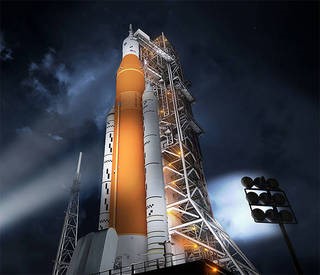Earth’s economy is facing considerable challenges from the COVID crisis, but the U.S. is looking to the future in a place far beyond the reach of the deadly disease.
This month, The White House released an Executive Order “Encouraging International Support for the Recovery and Use of Space Resources.” The move addressed American policy regarding the recovery and use of resources in outer space, including the Moon and beyond. It also notes that Americans should have the right to engage in commercial exploration, recovery, and use of resources in outer space, consistent with applicable law.
The Secretary of State will lead a U.S. Government effort to develop “joint statements, bilateral agreements, and multilateral instruments” with like-minded foreign states to enable safe and sustainable operations for the commercial recovery and use of space resources. It specifies that American industry and the industries of like-minded countries will benefit from the establishment of stable international practices by which private citizens, companies and the economy will benefit from expanding the economic sphere of human activity beyond the Earth.
The move is not without controversy, one which has been brewing since 1979. Frank Vernuccio, editor-in-chief of this publication, attended hearings of the U.N.’s “Committee on the Peaceful Uses of Outer Space” at the time, and heard first-hand the rather extraordinary claims by several nations that any profits gleaned from activities such as mining the moon or asteroids were allegedly the “common heritage of mankind.” This was a rather indirect way of saying that even those that invested nothing in space exploration or development should have a share in any profits. That idea would, of course, substantially discourage space-faring nations and private businesses from advancing into this realm of economic activity. In a memo to the State Department, he urged them to reject the concept. Fortunately, America never did agree to that misguided concept.
The controversy has arisen anew. The Moscow Times reports that “Russia’s space agency Roscosmos has denounced U.S. President Donald Trump’s order allowing commercial lunar mining and the extraction of other resources in space, appearing to liken the policy to colonialism… Roscosmos said in a statement Tuesday that ‘attempts to expropriate outer space and aggressive plans to actually take over other planets” deter international cooperation in the space arena.’”
A 1967 treaty prohibits the placement of weapons of mass destruction beyond Earth’s atmosphere, but does not rule against peaceful activities such as mining.
The Daily Mail reports that Kremlin spokesman Dmitry Peskov has stated, in relation to President Trump’s Executive Order, that “any kind of attempt to privatize space in one form or another – and I find it difficult to say now whether this can be seen as an attempt to privatize space – would be unacceptable.”
The controversy may become more pronounced. NASA is following the White House’s ambitious and enthusiastic pursuit of space exploration and exploitation. It’s recently released report discussing the Artemis Program, which will return humans to the Lunar surface for the first time since the famed Apollo program, includes a recognition of commercial activities. It states that “The Moon is more than a physical destination. A core focus of Artemis is to extend the nation’s geo-strategic and economic sphere to encompass the Moon with international partners and private industry. The United States will build confidence among its commercial, U.S. government, and international partners by leading the development of clear policy principles to support civil space exploration … Specifically, the U.S. will establish a predictable and safe process for the extraction and use of space resources…”
The development of resources beyond Earth has the potential to enrich the planet much as Columbus’ discovery of The New World did over a half-millennia ago. That progress should not be hampered by states that seek to claim benefits from activities they neither invested in nor assisted.
Illustration: Artist’s concept of the Space Launch System rocket and Orion capsule prepared for launch.(NASA)
